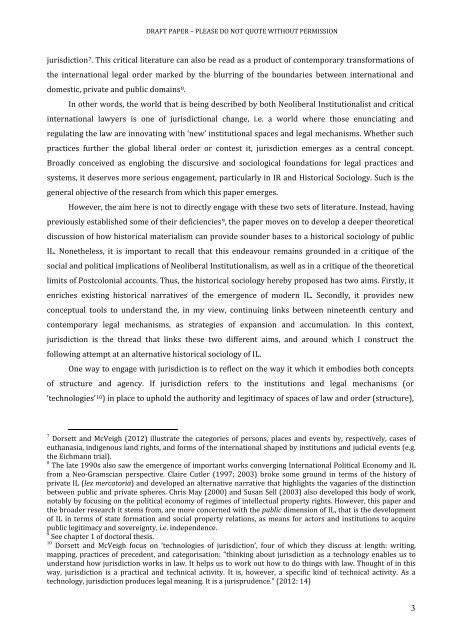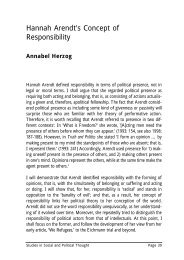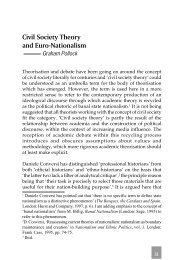Historical Materialism and International Law - University of Sussex
Historical Materialism and International Law - University of Sussex
Historical Materialism and International Law - University of Sussex
You also want an ePaper? Increase the reach of your titles
YUMPU automatically turns print PDFs into web optimized ePapers that Google loves.
DRAFT PAPER – PLEASE DO NOT QUOTE WITHOUT PERMISSION<br />
jurisdiction 7 . This critical literature can also be read as a product <strong>of</strong> contemporary transformations <strong>of</strong><br />
the international legal order marked by the blurring <strong>of</strong> the boundaries between international <strong>and</strong><br />
domestic, private <strong>and</strong> public domains 8 .<br />
In other words, the world that is being described by both Neoliberal Institutionalist <strong>and</strong> critical<br />
international lawyers is one <strong>of</strong> jurisdictional change, i.e. a world where those enunciating <strong>and</strong><br />
regulating the law are innovating with ‘new’ institutional spaces <strong>and</strong> legal mechanisms. Whether such<br />
practices further the global liberal order or contest it, jurisdiction emerges as a central concept.<br />
Broadly conceived as englobing the discursive <strong>and</strong> sociological foundations for legal practices <strong>and</strong><br />
systems, it deserves more serious engagement, particularly in IR <strong>and</strong> <strong>Historical</strong> Sociology. Such is the<br />
general objective <strong>of</strong> the research from which this paper emerges.<br />
However, the aim here is not to directly engage with these two sets <strong>of</strong> literature. Instead, having<br />
previously established some <strong>of</strong> their deficiencies 9 , the paper moves on to develop a deeper theoretical<br />
discussion <strong>of</strong> how historical materialism can provide sounder bases to a historical sociology <strong>of</strong> public<br />
IL. Nonetheless, it is important to recall that this endeavour remains grounded in a critique <strong>of</strong> the<br />
social <strong>and</strong> political implications <strong>of</strong> Neoliberal Institutionalism, as well as in a critique <strong>of</strong> the theoretical<br />
limits <strong>of</strong> Postcolonial accounts. Thus, the historical sociology hereby proposed has two aims. Firstly, it<br />
enriches existing historical narratives <strong>of</strong> the emergence <strong>of</strong> modern IL. Secondly, it provides new<br />
conceptual tools to underst<strong>and</strong> the, in my view, continuing links between nineteenth century <strong>and</strong><br />
contemporary legal mechanisms, as strategies <strong>of</strong> expansion <strong>and</strong> accumulation. In this context,<br />
jurisdiction is the thread that links these two different aims, <strong>and</strong> around which I construct the<br />
following attempt at an alternative historical sociology <strong>of</strong> IL.<br />
One way to engage with jurisdiction is to reflect on the way it which it embodies both concepts<br />
<strong>of</strong> structure <strong>and</strong> agency. If jurisdiction refers to the institutions <strong>and</strong> legal mechanisms (or<br />
‘technologies’ 10 ) in place to uphold the authority <strong>and</strong> legitimacy <strong>of</strong> spaces <strong>of</strong> law <strong>and</strong> order (structure),<br />
7 Dorsett <strong>and</strong> McVeigh (2012) illustrate the categories <strong>of</strong> persons, places <strong>and</strong> events by, respectively, cases <strong>of</strong><br />
euthanasia, indigenous l<strong>and</strong> rights, <strong>and</strong> forms <strong>of</strong> the international shaped by institutions <strong>and</strong> judicial events (e.g.<br />
the Eichmann trial).<br />
8 The late 1990s also saw the emergence <strong>of</strong> important works converging <strong>International</strong> Political Economy <strong>and</strong> IL<br />
from a Neo-Gramscian perspective. Claire Cutler (1997; 2003) broke some ground in terms <strong>of</strong> the history <strong>of</strong><br />
private IL (lex mercatoria) <strong>and</strong> developed an alternative narrative that highlights the vagaries <strong>of</strong> the distinction<br />
between public <strong>and</strong> private spheres. Chris May (2000) <strong>and</strong> Susan Sell (2003) also developed this body <strong>of</strong> work,<br />
notably by focusing on the political economy <strong>of</strong> regimes <strong>of</strong> intellectual property rights. However, this paper <strong>and</strong><br />
the broader research it stems from, are more concerned with the public dimension <strong>of</strong> IL, that is the development<br />
<strong>of</strong> IL in terms <strong>of</strong> state formation <strong>and</strong> social property relations, as means for actors <strong>and</strong> institutions to acquire<br />
public legitimacy <strong>and</strong> sovereignty, i.e. independence.<br />
9 See chapter 1 <strong>of</strong> doctoral thesis.<br />
10 Dorsett <strong>and</strong> McVeigh focus on ‘technologies <strong>of</strong> jurisdiction’, four <strong>of</strong> which they discuss at length: writing,<br />
mapping, practices <strong>of</strong> precedent, <strong>and</strong> categorisation: “thinking about jurisdiction as a technology enables us to<br />
underst<strong>and</strong> how jurisdiction works in law. It helps us to work out how to do things with law. Thought <strong>of</strong> in this<br />
way, jurisdiction is a practical <strong>and</strong> technical activity. It is, however, a specific kind <strong>of</strong> technical activity. As a<br />
technology, jurisdiction produces legal meaning. It is a jurisprudence.” (2012: 14)<br />
3
















